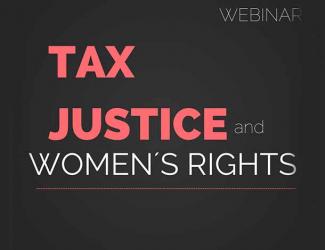On Tuesday 16 June 2015, on the occasion of the Global Week of Action for #Taxjustice, we co-organized with the Center for Economic and Social Rights (CESR), and the Center for Women's Global Leadership (CWGL) a webinar on Tax Justice and Women's Rights. Over 100 women’s rights and feminist activists participated in a discussion linking tax policies to the achievement of women's rights & social justice.
Our four expert panelists gave examples of gender bias in taxation and the incidence of VAT on poor women. They contested the male breadwinner model that still dominates taxation policies around the world and that continues to rely on women’s unpaid work.
Specific advocacy spaces for influencing tax justice at the international level were discussed, in particular the Third Financing for Development Conference to be held in Addis Abbaba in July 2015.
Listen to the audio of the webinar here
Presentations and Highlights:

Kate Donald, from the Center for Economic and Social Rights (CESR) explained why taxation is a feminist issue focusing on tax policies from two different angles: resourcing for human rights and redistribution. She stressed that:
- It is impossible to fulfill women’s rights without the necessary resources to pay for education, health, or social protection
- It is State’s obligation to raise the needed resources to achieve human rights also through tax collection
- By re-distributing income and wealth, tax policies ultimately distribute power
- Because the richest 1% that can avoid paying taxes is overwhelmingly male, neoliberal tax policies are disadvantaging women and putting more money into elite men’s pockets.

Corina Rodriguez, from Development Alternatives for Women in a New Era (DAWN), explained the intersection between gender inequality and socioeconomic inequality evidenced in tax policy design. Illustrating with case studies from Argentina and Central America, she showed the gendered negative implications of regressive tax policies:
- Progressive tax policies are those that allocate the tax burden on those who have the highest economic resources
- Regressive tax policies, like tax systems that rely heavily on the Value Added Tax (VAT) on common goods, do the exact opposite affecting poorer women the most
- Recent research shows that the revenue loss due to tax exemptions to attract foreign direct investment in Central America, represents as much as the whole health budget for some countries in the region.

Radhika Balakrishnan, from the Center for Women's Global Leadership (CWGL) at Rutgers University, focused on how human rights norms can be used to help raise needed resources through taxation by invoking the principle of Maximum Available Resources. With examples from the United States and Mexico, she explained:
- Why countries with lower tax-to-GDP ratio (ratio of tax collection against the national Gross Domestic Product) have less ability to provide the services that are essential for the fulfillment of human rights
- Tax evasion and avoidance is clearly higher for corporate sectors than for individuals
- The fact that tax policies are written in such a perverse way that the more money someone has, the easiest it is for them to avoid paying taxes.

Attiya Waris, from Tax Justice Network – International, explained with examples from the African region how informal workers -the majority of which are women- are already paying taxes, for example through the VAT, in larger amounts in relation to their income if we compare with what corporations pay.
- Recent research proved that African countries with the lowest tax-to-GDP ratio had the highest maternal and child mortality indicating that the low level of resources raised through tax revenues has an indirect effect on healthcare provision for women and the most vulnerable populations
- Speaking to advocacy entry points to influence tax policies from a gender perspective, she argued that women’s rights organizations and gender equality advocates must participate in the assessment of national budgets, questioning incentives given to some economic sectors over others.
Highlights from our #TaxJustice Twitter conversation
#TaxJustice is a feminist issue. Women's human rights issue: revenue, resourcing rights, redistribution of wealth and power.
— Thandiwe T Chihana (@AfriWoman) June 16, 2015
#TaxJustice is recognition and assigning value to unpaid #carework - it needs to be quantified in hours and put a fiscal value on it @AWID
— M Pindel (@MonikaPindel) June 16, 2015
#taxjustice is a #feminist issue because the costs of underfunded states are disproportionately borne by women @AWID
— David Quentin (@_DavidQuentin) June 16, 2015
